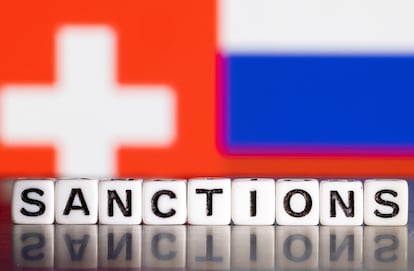Russian invasion of Ukraine places Swiss neutrality in the spotlight
Switzerland has traditionally been immovable on its neutral stance during conflicts but politicians are debating several motions to allow the re-export of weapons to Kyiv

Russia’s invasion of Ukraine has presented many governments with difficult decisions over the course of the past year. Germany has broken a decades-long taboo in its foreign and defense policy by providing military support to Ukraine; Finland and Sweden have requested NATO membership and other administrations have been placed under pressure due to their relationships with Moscow. Switzerland, located in the heart of Europe and surrounded on all sides by EU member states, is in no doubt as to the identity of aggressor and victim in the Ukraine war, but the conflict has put the country’s traditional neutrality – one of the cornerstones of its foreign policy – to the test. It has also sparked debate about the limits of that neutrality and Bern’s ability to respond to a situation that has not witnessed since the Second World War.
Switzerland’s federal government, which has openly condemned the Russian invasion and supported EU sanctions against the Kremlin, last Friday rejected a Spanish request to transfer two Swiss-made anti-aircraft guns from Madrid’s arsenal to Kyiv, arguing that Swiss legislation prevents the re-exportation of military equipment to countries at war in line with its neutral stance on armed conflicts. Previously, Bern had also denied similar requests from Denmark and Germany to provide Swiss-manufactured anti-aircraft ammunition to the Ukrainian military.
Pressure from Berlin has been to no avail and German Vice Chancellor Robert Habeck aired his grievance in an interview with Die Zeit on Wednesday: “We are in talks with Switzerland and I have to say it clearly: I cannot understand why Switzerland will not make ammunition available for the Gepards [self-propelled anti-aircraft guns],” Habeck said. Berlin has asked for authorization to provide 12,000 35mm shells purchased from Switzerland to send to Ukraine for use in these armored vehicles.
Demands on Bern to change its stance and allow for the delivery of armaments to Kyiv by third parties has opened a debate in parliament, where several parties have tabled motions to make changes to legislation that was tightened in 2021 in order to bolster Switzerland’s ability to refuse such requests in a way that is compatible with its policy of neutrality. “For the first time in a long time we are facing a conflict in which a country has clearly violated the UN Charter as an aggressor and which activates the right to collective defense, and the question as to whether Switzerland should participate is very controversial,” Thomas Cottier, professor emeritus of international and European economic law at the University of Bern, said via videoconference. Two schools of thought clash in the discussion: “The one that anchors neutrality in consuetudinary law, which considers that Switzerland should treat the parties equally and the other – in which I include myself – that argues the United Nations Charter should be taken into account and that the aggressor and the attacked should not be treated equally. But it is a controversial issue, which has been stirred up by the debate on re-export permits.”
A recent poll published by Neue Zürcher Zeitung indicates that 55% of the Swiss population would support third-party delivery of weapons purchased from Switzerland.
Thierry Burkart, president of the center-right Liberals (FDP) and a member of parliament, told EL PAÍS in a telephone conversation that he had already tabled a motion in the National Council – the lower house of the Federal Assembly – in June 2022 to lower the re-export permit requirement for 25 countries that share Switzerland’s democratic values and human rights protections. Burkart believes that the background to the issue “has nothing to do with neutrality, but with an arms export law that has been tightened at the instigation of the left.” Direct sales to a country at war are prevented by Swiss law, “but preventing others from doing so in order to help Ukraine has nothing to do with neutrality; in this way you are helping Russia; you are indirectly supporting the aggressor.”
Burkart is therefore pushing an amended motion with support from other parties to modify the law to reduce the permit requirement to five years for a list of countries – including some EU member states, the United States, Australia, Japan and Canada, among others – and that would be applicable to armaments purchased from Switzerland five years ago, facilitating the delivery of war materiel to Ukraine.
The issue has caused some division among the nationalist-conservative SVP, which holds the most seats in the National Council. While some support the proposal, arguing that it favors the country’s arms industry, the debate has also led to the collection of signatures to force a popular vote on a proposal to cement an even more restrictive neutrality into the Constitution, one that would prevent sanctions against Russia.
The Social Democrats (SP), who in 2021 supported the tightening of legislation to prevent Swiss weapons from ending up in theaters of war such as Yemen, are also reconsidering their stance. “We continue to defend [the 2021 legislation], but we also have an obligation of solidarity with Ukraine, which is why we have sought a solution in line with international law and neutrality,” said SP parliamentarian Franziska Roth by telephone. The SP’s proposal would allow the restriction to be lifted temporarily if the UN Security Council determines that the ban on the use of force has been violated – something that is not possible now due to Russia’s veto – or if there is a condemnation by the UN General Assembly by a two-thirds majority, as was the case after the invasion began.
For Roth, the Social Democratic initiative is “the exception, as restricted as possible,” which on the basis of international law makes it possible to safeguard Swiss neutrality. “No one was counting on a war of invasion like the one Russia has unleashed. No wonder there is external pressure on Switzerland and as a European, I don’t like to talk about war materiel, but it is clear that we have an obligation to show solidarity. We have sought a pragmatic compromise.”
These initiatives point to a possible legislative change in favor of Ukraine’s requirements but any final decision faces a long parliamentary journey with the possibility that parties such as the Greens, who oppose the motion, will call for a referendum if a majority is reached.
Swiss neutrality “no longer in keeping with the times”
In the meantime, “valuable time is being lost,” says Cottier, who says that under current Swiss law arms re-exports are possible in “extraordinary circumstances” such as the war in Ukraine. Cottier has drafted a legal opinion in which he argues that, on the basis that the Russian invasion represents such circumstances, international law would support a refusal by third-party countries to comply with the Swiss ban. “There is no need to hide behind Swiss neutrality. In the case of the Leopards, Poland said that it was considering this option in the face of German refusal [to authorize export of the tanks].”
The issue has also raised questions about the very viability of Swiss neutrality. Cottier is among those who are in favor of abandoning it. “It is no longer in keeping with the times,” the professor states. “But that is a minority position. I have the impression that pragmatic steps will be taken in that direction. Neutrality in Switzerland is a matter of faith for many, and I suppose the government will not want to question it, but with legal changes like the one on arms re-exports it will tend toward limiting it without altering its name.”
Polls show that support for neutrality is still overwhelming: a survey for the government indicated that between January 2022, before the invasion, and June 2022, backing for Swiss neutrality fell from 97% to 89%, but support for limited cooperation with NATO that would not imply joining the Alliance also increased from 45% to 52%.
Sign up for our weekly newsletter to get more English-language news coverage from EL PAÍS USA Edition
Tu suscripción se está usando en otro dispositivo
¿Quieres añadir otro usuario a tu suscripción?
Si continúas leyendo en este dispositivo, no se podrá leer en el otro.
FlechaTu suscripción se está usando en otro dispositivo y solo puedes acceder a EL PAÍS desde un dispositivo a la vez.
Si quieres compartir tu cuenta, cambia tu suscripción a la modalidad Premium, así podrás añadir otro usuario. Cada uno accederá con su propia cuenta de email, lo que os permitirá personalizar vuestra experiencia en EL PAÍS.
¿Tienes una suscripción de empresa? Accede aquí para contratar más cuentas.
En el caso de no saber quién está usando tu cuenta, te recomendamos cambiar tu contraseña aquí.
Si decides continuar compartiendo tu cuenta, este mensaje se mostrará en tu dispositivo y en el de la otra persona que está usando tu cuenta de forma indefinida, afectando a tu experiencia de lectura. Puedes consultar aquí los términos y condiciones de la suscripción digital.









































